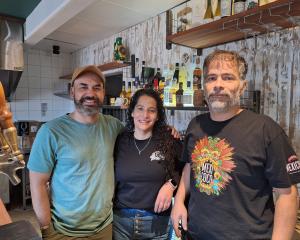Queenstown bar owners appear relaxed about a district-wide police initiative that has involved officers going undercover in the resort during last month's Winter Festival.
In an operation the Hospitality Association has called ''outrageous'', Southern district police have begun stationing plainclothes officers in licensed premises to ensure licensees are complying with the Sale and Supply of Alcohol Act.
The approach was first applied during the Queenstown Winter Festival, with Otago rural prevention manager Senior Sergeant Allan Grindell confirming the operation involved four plainclothes staff visiting 22 licensed premises over two nights late last month.
The initiative will run throughout the Southern police district until July next year, with police focusing on how well licensees prevent patrons from becoming intoxicated, and how they manage patrons who are already intoxicated.
Hospitality Association chief executive Bruce Robertson told the Otago Daily Times yesterday undercover officers would be ''spying on patrons'', and that licensees should be inspected by uniformed police officers.
However, Watertight Group owner Michael Burgess, who co-owns five Queenstown bars, said he did not have a problem with the tactic.
''It is a covert operation, but at the end of the day, if you're playing with a straight bat you've got nothing to worry about.
''It may be that it's the best approach.''
He hoped the police would take a co-operative rather than punitive approach to deal with issues that emerged, and work with bar owners to sort them out.
''We invest a lot of time, money and effort to make sure we comply with the law.
''It's not an exact science and we don't get it right all the time.''
The Bunker Restaurant and Bar owner Cameron Mitchell said covert operations by police in licensed premises were ''nothing new'', but their resources could be better spent ''putting more uniforms on the streets''.
The general public was more likely to be upset by the undercover approach than bar owners, who had to deal with the effects of low-priced alcohol and pre-loading, Mr Mitchell said.
Bar owners invested a lot of money in their businesses, and were ''operating a controlled environment where people can have a good time''.
He was planning an initiative in which bar owners and security companies would work with police and the Queenstown Lakes District Council to employ social media to create an information-sharing network to deal with intoxicated patrons.
Such networks had been successful in Australia and smaller provincial centres in New Zealand such as Nelson, he said.
Snr Sgt Grindell said the officers involved in the operation in Queenstown had made notes on what they observed.
That information was being reviewed and ''action of some form could still be taken''.
No patrons of the premises visited by the officers had been arrested or warned as a result of the monitoring.
It had been the first such deployment of officers in the Southern Police District, and there would be ''learnings'' from the exercise, he said.
''Although no direct interventions were carried out on the night, the staff involved gathered a considerable amount of information on patron behaviour, host responsibility and some criminal offending.''
Plainclothes officers would be deployed in Queenstown again ''at some time during the year''.












